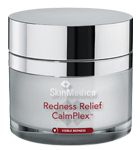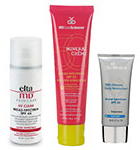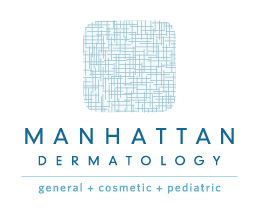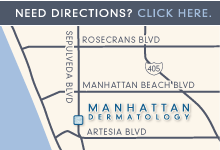Rosacea + Redness
Rosacea is a complex inflammatory condition, but because we are starting to understand it more and more, we have better resources, medications and treatments available. Like acne, rosacea is chronic and can be frustrating—but our team is here to help. Using a combination approach of prescription medications, special sunscreens, and optional laser and light treatments, we will partner with you attain the results you desire. Daily attention to your skin as well as your skin care routine are critical to successful treatment, and we will show you how to take excellent care of your skin. For more information on rosacea, visit the National Rosacea Society and check out Dr. Magovern's interview on DermStore, 5 Dermatologist Tips for Managing Rosacea.
Rosacea Treatments at Manhattan Dermatology
Prescription Medications
Prescription medications can be important in your rosacea regimen, but knowing how to use them and in what combination is critical. Most medications are covered by prescription health plans.
Intense Pulsed Light (IPL or Photofacial)
IPL photo rejuvenation can be very effective in combating the redness and broken blood vessels that are common in rosacea patients. With minimal downtime, this is an easy, non-invasive procedure. A series of 3-5 treatments is usually necessary for best results.
Non-Prescription Products
 Although rosacea is a medical condition, it has cosmetic consequences, and there are several very effective products on the market that do not require a prescription. A good daily skin care routine is critical for rosacea patients, and needs to include gentle cleansing, moisturizing to restore and maintain the skin barrier, and the use of an anti-inflammatory product (sometimes a prescription) and sunblock. Some of Dr. Magovern's favorite non-prescription products for facial redness are SkinMedica Redness Relief CalmPlex and CeraVe Moisturizing Lotion. CeraVe also makes a nice night moisturizer, CeraVe Moisturizing Facial Lotion PM.
Although rosacea is a medical condition, it has cosmetic consequences, and there are several very effective products on the market that do not require a prescription. A good daily skin care routine is critical for rosacea patients, and needs to include gentle cleansing, moisturizing to restore and maintain the skin barrier, and the use of an anti-inflammatory product (sometimes a prescription) and sunblock. Some of Dr. Magovern's favorite non-prescription products for facial redness are SkinMedica Redness Relief CalmPlex and CeraVe Moisturizing Lotion. CeraVe also makes a nice night moisturizer, CeraVe Moisturizing Facial Lotion PM.
Sunblock
 When it comes to rosacea, sun protection is absolutely crucial. Sunblock use alone can significantly improve rosacea symptoms. Sunblock should be applied every morning, even if you don't think you are going outdoors. Because rosacea patients generally have sensitive skin, a sunblock without potentially irritating chemical ingredients is usually the best option. Click here to view some of Dr. Magovern's favorites.
When it comes to rosacea, sun protection is absolutely crucial. Sunblock use alone can significantly improve rosacea symptoms. Sunblock should be applied every morning, even if you don't think you are going outdoors. Because rosacea patients generally have sensitive skin, a sunblock without potentially irritating chemical ingredients is usually the best option. Click here to view some of Dr. Magovern's favorites.
Call us today at 310.546.1188 to schedule an appointment (or request one online) to discuss treatment options for rosacea. We look forward to seeing you!









